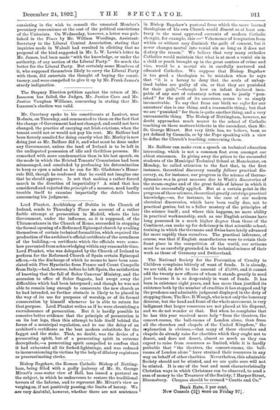Lord Planket, Archbishop of Dublin in the Church of Ireland,
sends to Thursday's Times an account of a rather feeble attempt at persecution in Madrid, where the late Government, under the influence, as it is supposed, of the Ultramontanes in the Church of Rome, succeeded in stopping -the formal opening of a Reformed Episcopal church by availing themselves of certain technical formalities, which required the production of the architect's official certificate of the soundness of the building,—a certificate which the officials were some- how prevented from acknowledging within any reasonable time. Lord Plunket, who was delegated by the Church of Ireland to perform for the Reformed Church of Spain certain Episcopal offices,—in the discharge of which he seems to have been asso- ciated with Pere Hyacinthe from France and Count Campello from Italy,—had, however, before he left Spain, the satisfaction of knowing that the fall of Sefior Canovas' Ministry, and the accession to office of Sefior Sagasta, had swept away the difficulties which had been interposed; and though he was not able to remain long enough to consecrate the new church as he had intended, no further obstacle is likely to be placed in the way of its use for purposes of worship, or of its formal consecration by himself whenever he is able to return for that purpose. Lord Plunket writes as if he were chronicling a recrudescence of persecution. But it is hardly possible to conceive better evidence that the principle of persecution is on its last legs, than this attempt to hide itself behind the forms of a municipal regulation, and to use the delay of an architect's certificate as the best modern substitute for the faggot and the stake. That, no doubt, was the device of a persecuting spirit, but of a persecuting spirit in extreme decrepitude,—a persecuting spirit compelled to confess that -it had exhausted all its forked-lightnings, and was reduced to inconveniencing its victims by the help of dilatory registrars or procrastinating clerks.


































 Previous page
Previous page